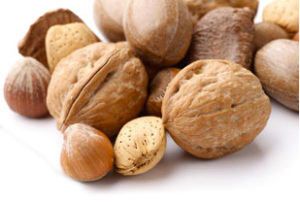
Finally the FDA is phasing out the use of artificial trans fats in foods (found in partially hydrogenated vegetable oils) within 3 years. It turns out that even though for many years scientists and the medical community pushed foods such as margarine (which have trans fats) as healthier than saturated fats such as butter, they were wrong. Instead the trans fats are linked to cardiovascular problems.
We can thank 100 year old Frank Kummerow for the ban, and for warning about trans fats for six decades! He is still drinking whole milk, eating eggs and butter, but he does avoid "fried foods, margarine, and anything associated with partially-hydrogenated oils". Other foods that are currently viewed as healthy by the medical community are extra virgin olive oil and coconut oil. However, please note that canola oil, currently viewed as a healthy and safe alternative to partially hydrogenated oils, also contains trans fats (due to the manufacturing process) and should be avoided. Also keep in mind that companies are allowed to say they have zero trans fat of they contain less than 0.5 grams per serving (which means the trans fats can add up over the course of a day). From The Washington Post:
The 100-year-old scientist who pushed the FDA to ban artificial trans fat
No one was more pleased by the Food and Drug Administration's decision Tuesday to eliminate artificial trans fats from the U.S. food supply than Fred Kummerow, a 100-year-old University of Illinois professor who has warned about the dangers of the artery-clogging substance for nearly six decades."Science won out," Kummerow, who sued the FDA in 2013 for not acting sooner, said in an interview from his home in Illinois. "It's very important that we don't have this in our diet."
In the 1950s, as a young university researcher, Kummerow convinced a local hospital to let him examine the arteries of people who had died from heart disease. He made a jarring discovery. The tissue contained high levels of artificial trans fat, a substance that had been discovered decades earlier but had become ubiquitous in processed foods throughout the country.
Later, he conducted a study showing that rats developed atherosclerosis after being fed artificial trans fats. When he removed the substance from their diets, the atherosclerosis disappeared from their arteries.
Kummerow first published his research warning about the dangers of artery-clogging trans fats in 1957. More than a decade later, while serving on a subcommittee of the American Heart Association, he detailed the massive amounts of trans fat in the shortening and margarines lining grocery shelves, and helped convince the food industry to lower the content in certain products.
Despite Kummerow's research and warnings over the years, artificial trans fats remained a staple of processed food for decades. Well into the 1980s, many scientists and public health advocates believed that partially hydrogenated oils were preferable to more natural saturated fats. And the food industry was reluctant to do away with artificial trans fats, which were cheaper than their natural counterparts, extended shelf life and gave foods desirable taste and texture.
Frustrated by the lack of action, Kummerow filed a 3,000-word citizen petition with the FDA in 2009, citing the mounting body of evidence against trans fat. The first line read: "I request to ban partially hydrogenated fat from the American diet."
In the 1990s, more and more studies had shown that trans fats were a key culprit in the rising rates of heart disease. The advocacy group Center for Science in the Public Interest also petitioned the FDA in 1994 to require that the substance be listed on nutrition labels -- a move that the agency put into place in 2006. In 2002, the Institute of Medicine found that there was “no safe level of trans fatty acids and people should eat as little of them as possible.” As the dangers of trans fat became clearer, public opinion also shifted, and food companies increasingly removed the substance from products, though it remained in a broad range of foods, from cake frostings to baked goods.
Four years after filing his petition and hearing nothing, Kummerow sued the FDA and the Department of Health and Human Services in 2013, with the help of a California law firm. The suit asked a judge to compel the agency to respond to Kummerow's petition and "to ban partially hydrogenated oils unless a complete administrative review finds new evidence for their safety."
Three months later, the FDA announced its plans to effectively eliminate trans fats by saying that the substance no longer would be assumed safe for use in human foods. Tuesday's action finalizes that initial proposal, and manufacturers will have three years to reformulate products or to petition the agency for an exception.

 New research finding health benefits to humans from a four day low calorie diet - the Fasting Mimic Diet (FMD). Cutting calories to 34 to 54% of normal for a few days is obviously much easier to do than actual fastiing, so these results look very promising. In summary: the researchers found that in a small human trial, three cycles of this diet given to 19 subjects once a month for five days decreased risk factors and biomarkers for aging, diabetes, cardiovascular disease and cancer (and with no major adverse side effects). Three earlier posts on various types of minifasting health benefits:
New research finding health benefits to humans from a four day low calorie diet - the Fasting Mimic Diet (FMD). Cutting calories to 34 to 54% of normal for a few days is obviously much easier to do than actual fastiing, so these results look very promising. In summary: the researchers found that in a small human trial, three cycles of this diet given to 19 subjects once a month for five days decreased risk factors and biomarkers for aging, diabetes, cardiovascular disease and cancer (and with no major adverse side effects). Three earlier posts on various types of minifasting health benefits:  This latest study confirms the benefits of eating peanuts and nuts. The Netherlands Cohort Study has studied 120, 000 Dutch men and women since 1986, and they found that eating approximately 1/2 handful of peanut or nuts per day is linked to a lower risk of mortality. However, this beneficial effect did not apply to peanut butter, and they theorize that it may be due to the added ingredients in it (salt and vegetable oils that are
This latest study confirms the benefits of eating peanuts and nuts. The Netherlands Cohort Study has studied 120, 000 Dutch men and women since 1986, and they found that eating approximately 1/2 handful of peanut or nuts per day is linked to a lower risk of mortality. However, this beneficial effect did not apply to peanut butter, and they theorize that it may be due to the added ingredients in it (salt and vegetable oils that are  The statements in this editorial may be obvious to many, but it is nicely written and needs to be said. Basically it says that exercise will not help you overcome the ill effects of a poor diet. I agree with what was said, but felt that what was missing was mention that a poor diet also has negative effects on the microbiome (the community of microbes living within the person) - which we know is linked to health problems.
The statements in this editorial may be obvious to many, but it is nicely written and needs to be said. Basically it says that exercise will not help you overcome the ill effects of a poor diet. I agree with what was said, but felt that what was missing was mention that a poor diet also has negative effects on the microbiome (the community of microbes living within the person) - which we know is linked to health problems. A big question for many adults is: how can one age well and live to a ripe old age? The author of the book
A big question for many adults is: how can one age well and live to a ripe old age? The author of the book